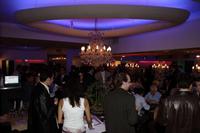| Sunday, May 28, 2006 |
| Creme de Violette |
 Oh, I need to write something about the event I was co-organizer of last week. It is called Creme de Violette. It is Lionel's idea. Speed Consulting. It is like Speed Dating, just different. The basic idea is that one invites some experts/consultants and some business people, and then one has rounds where the participants can go and talk with the experts and ask them questions, and have a little free consulting session in 11 minutes, until the gong sounds and the next round starts. Oh, I need to write something about the event I was co-organizer of last week. It is called Creme de Violette. It is Lionel's idea. Speed Consulting. It is like Speed Dating, just different. The basic idea is that one invites some experts/consultants and some business people, and then one has rounds where the participants can go and talk with the experts and ask them questions, and have a little free consulting session in 11 minutes, until the gong sounds and the next round starts.
In France this has been done in Paris, but apparently nowhere else. So, the idea here is to do it in a more relaxed southern way, with good food and wine in a restaurant. And, well, this is the third time we did this. The first two times I was one of the experts, which was quite fun, and even got me an interesting project and a part of a little upstart company. This time we had more partners participating, and added some new elements, which actually made it a good deal more interesting. The basic idea was to add elements that are "speed" oriented, or that makes something happen in real-time during the evening, and which facilitate the networking. It didn't all work, but it didn't matter too much, as what worked worked well. But I had for example made a database meant to keep profiles of all participants, so that everybody would have a little bio and picture, and maybe a statement of what they offer, or what they're looking for, and that would be available during the evening, and/or before and after, as possible. Which makes it a good deal easier to do networking, as you're able to know who everybody is. I've done similar things at events before, with very good results. The MC was a well-known talkshow host and public speaker, Yann Fernandez. There was a journalist interviewing participants. A professional photographer taking pictures of everybody. Somebody taking video. Several people who's job it was to help people find each other. Several hostesses. One thing that worked really well was the production of a newsletter during the evening. In one corner was a little production team with computers. A video projector showed what they were working on at the time. They would get photos from the photographer, the journalist would submit articles, and they would lay it out. All during the evening. You can see the result as a PDF. The idea was that at the end of the evening, everybody would leave with a copy of it. But that depended on a few other technical details that didn't work. Like the WiFi internet connection. And therefore the internet sharing application we had planned, based on a clever invention from a local startup company, Personalité Numerique, which basically turns any USB key into a large virtual disk, from which one transparently can share data with others. Anyway, overall it was a success, and we'll be sure to develop some of these ideas further. Which incidentally have created a bit of interest from various organizations that are interested in having more effective networking events. [ Diary | 2006-05-28 22:59 | 4 comments | PermaLink ] More > |
| Why e-mails are so easily misunderstood |
Article here about some people studying e-mail communication, and how it can go wrong.Though e-mail is a powerful and convenient medium, researchers have identified three major problems. First and foremost, e-mail lacks cues like facial expression and tone of voice. That makes it difficult for recipients to decode meaning well. Second, the prospect of instantaneous communication creates an urgency that pressures e-mailers to think and write quickly, which can lead to carelessness. Finally, the inability to develop personal rapport over e-mail makes relationships fragile in the face of conflict. [ Information | 2006-05-28 23:21 | 6 comments | PermaLink ] More > |